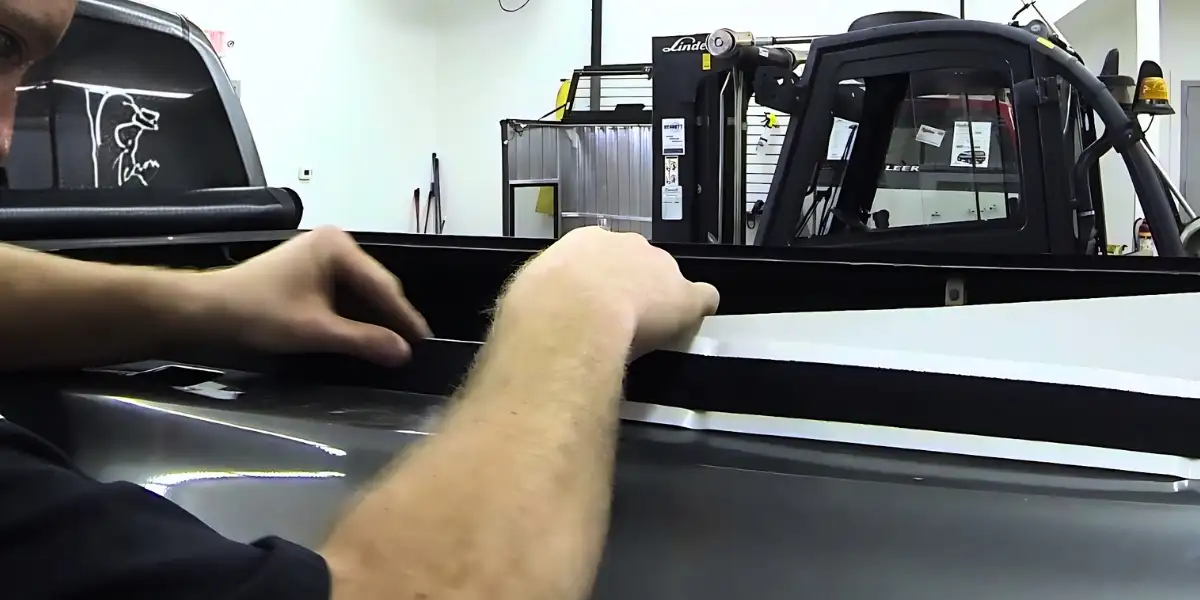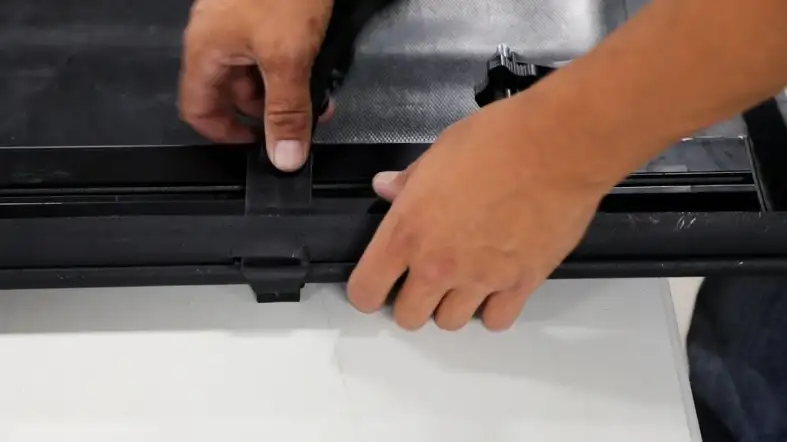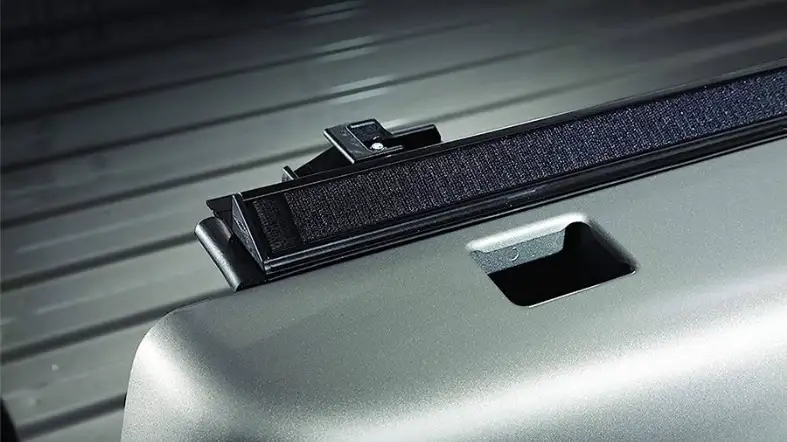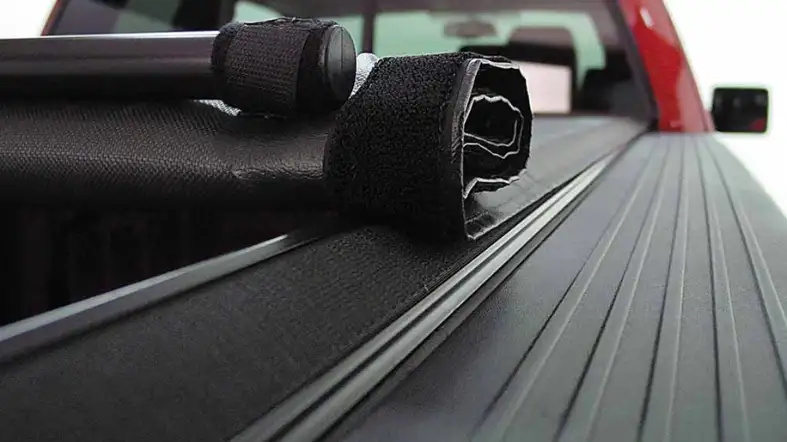Can you replace the Velcro on a tonneau cover? Discover the solution to this common concern for truck owners.
If your tonneau cover’s Velcro is worn out or damaged, don’t worry! This article explores the possibilities of replacing the Velcro on your tonneau cover.
Find out why you should replace your Velcro tonneau cover, and follow our step-by-step guide to do so.

Can You Replace the Velcro on a Tonneau Cover?
Yes, it’s easy to replace the Velcro on tonneau covers. Simply follow a step-by-step guide to remove the old Velcro and attach the new one.
It’s an effective solution to ensure the proper functioning of your tonneau cover.
Signs That Indicate Velcro Replacement is Needed
There are a number of signs that indicate that you should replace the Velcro on your Tonneau Cover
Weak Bonding Power
You notice that your Velcro no longer sticks together as firmly as it used to. When you attempt to secure items, they easily detach with the slightest movement.
The weakening of the bond indicates worn Velcro hooks and loops.
Visible Wear and Tear
Take a close look at your Velcro. Do you spot any signs of fraying, peeling, or tearing? Wearing or damaged Velcro hooks or loops indicates it’s time for a new one.
Continuing to use it in this condition will only lead to further deterioration.
Reduced Adhesive Strength
Velcro often comes with an adhesive backing to ensure a secure attachment. This adhesive may lose its effectiveness.
Replace Velcro adhesive when it no longer adheres firmly, or if it peels off easily.
Inconsistent Closure
One of the most frustrating signs of Velcro deterioration is inconsistent closure. Attempting to fasten the Velcro causes it to not align correctly.
Velcro no longer maintains a reliable closure as a result of this inconsistency.
Excessive Lint or Debris Buildup
With time, Velcro hooks and loops can accumulate lint, hair, and other debris. As a result of this buildup, Velcro becomes weaker.
You need to replace Velcro if you find it difficult to remove debris or see a significant buildup.
Loss of Elasticity
Some Velcro products incorporate elastic bands for flexibility and stretchability.
Velcro has reached its end if the elastic loses its resilience and fails to deliver the desired tension.
An elastic band that no longer stretches will not securely fasten your belongings.
Unusual Odor
A strange, unpleasant odor emanating from your Velcro may suggest the growth of mildew or mold.
This odor is often an indication of moisture trapped within the hooks and loops.
If this happens, replacing the Velcro immediately is crucial to preventing further damage.
Benefits of Replacing Velcro on a Tonneau Cover

Here are the benefits of replacing the Velcro on your tonneau cover:
Enhanced Security
The primary purpose of a tonneau cover is to secure your truck bed and its contents. When the Velcro loses its grip, it compromises the security of your cargo.
By replacing it, you ensure that your belongings remain safe during transport.
Weather Protection
Tonneau covers protect against rain, snow, and harsh sunlight. Damaged Velcro can create gaps and weak spots, which can cause moisture or sunlight to seep through and damage the cargo.
By replacing the Velcro, you restore the cover’s weather-resistant capabilities, ensuring reliable protection.
Improved Aesthetics
Tonneau covers not only enhance your truck’s functionality but also add to its overall appearance.
Tonneau covers can look shabby and neglected if the Velcro is worn out. By replacing the Velcro, you restore the cover’s appearance.
Quieter Operation
You may experience unpleasant noises when you open or close the tonneau cover as it ages and wears out.
This can be particularly bothersome during quiet drives or when you park in a residential area.
You can eliminate annoying noises by replacing the Velcro, allowing for smoother, quieter operation.
Ease of Use
A properly functioning tonneau cover should be easy to open, close, and secure. Worn-out Velcro can make these actions more challenging and time-consuming.
It’s easier to access your truck bed and secure the cover when you replace the Velcro.
Extended Lifespan
Your tonneau cover can last longer if you replace its worn Velcro. A neglected Velcro issue can result in more extensive repairs or a complete cover replacement.
Your tonneau cover will last longer if you replace the Velcro regularly, saving you time and money.
Step-by-Step Guide: How to Replace Velcro on a Tonneau Cover

Follow these simple instructions to restore the functionality and security of your cover.
Step 1: Gather the Necessary Tools
Before you begin, gather the tools you’ll need for the replacement process.
You’ll also need a screwdriver or socket wrench (depending on your cover), scissors, a cleaning solution, a soft cloth, and Velcro patches.
Step 2: Remove the Old Velcro
Start by opening the tonneau cover completely. Carefully remove the old Velcro from both the cover and the truck bed.
If the Velcro is attached with screws or bolts, use the appropriate tool to remove them. Be sure to keep track of any hardware you remove for later use.
Step 3: Clean the Surface
Once the old Velcro is removed, take a moment to clean the surface where the Velcro will be attached.
Use a cleaning solution or mild detergent and a soft cloth to remove any dirt, debris, or residue. Ensure that the surface is completely dry before proceeding.
Step 4: Measure and Cut the New Velcro
Measure the new Velcro patches against the old Velcro. Use a pair of scissors to cut the Velcro to the appropriate size.
It’s crucial to ensure that the new Velcro matches the dimensions of the old Velcro for a proper fit.
Step 5: Attach the New Velcro
Start by attaching the hook side of the new Velcro to the tonneau cover. Press firmly to ensure a secure bond.
Next, attach the loop side of the Velcro to the truck bed, aligning it with the hook side on the cover. Press down firmly to secure it in place.
Step 6: Reinstall Hardware (if applicable)
Now is the time to reinstall the screws or bolts used to attach the Velcro to your tonneau cover.
Carefully line up the holes, then tighten them to secure the Velcro. Be cautious not to overtighten, as it may damage the cover or the truck bed.
Step 7: Test and Adjust
Once the new Velcro is in place, carefully close the tonneau cover and test its functionality.
Ensure that the Velcro provides a secure and tight closure, preventing any movement or unwanted openings. The Velcro can be repositioned or trimmed if necessary.
How to Choose Tonneau Cover Replacement Velcro?
Here are some key factors to consider before making your purchase:
Hook and Loop Type
Velcro consists of two main components: the hook side and the loop side. When choosing replacement Velcro, make sure that both the hook and loop sides are included.
Ensure the replacement Velcro fits your tonneau cover’s existing components to ensure a proper fit.
Strength and Bonding Power
Tonneau covers require Velcro replacements that have reliable bonding power and a strong grip.
Tonneau covers of various sizes and weights require Velcro that can handle the load.
Durability and Weather Resistance
Replacement Velcro for Toneau covers must be weather-resistant and durable.
A high-quality Velcro can withstand moisture, UV rays, extreme temperatures, and other environmental factors.
Adhesive Backing
Velcro can be installed with adhesive backing. Alternatively, you can sew or use additional adhesives to secure Velcro to your tonneau cover.
Make sure the adhesive is strong and long-lasting.
Size and Width
Check the width and length of the existing Velcro on your tonneau cover before choosing replacement Velcro.
Make sure the Velcro matches your tonneau cover’s dimensions to ensure a proper fit.
Ease of Installation
When choosing replacement Velcro, consider your DIY skills. While some Velcro options require sewing, others are easier to apply with adhesive backing.
Choose a replacement Velcro that aligns with your installation capabilities.
Brand and Quality
Opt for reputable brands known for producing high-quality Velcro products.
Read customer reviews and ratings to gauge the performance and reliability of different brands.
A trusted brand will likely result in a longer-lasting replacement Velcro.
Price and Value
Consider the quality and features of replacement Velcro options when comparing prices.
Higher-quality Velcro provides better performance and longevity. Aim for a balance between affordability and value.
Maintenance Tips for Extending the Lifespan of Velcro on Tonneau Covers

For good condition and function, follow these tips for extending Velcro’s life.
Regular Cleaning
Use a soft brush or toothbrush to gently scrub the Velcro on your tonneau cover. Avoid using excessive force or harsh chemicals that may damage the Velcro.
Avoid Excessive Exposure to Moisture
Velcro’s integrity is still susceptible to moisture even when tonneau covers protect against it.
When it rains or snows, avoid leaving your tonneau open. Allow Velcro to air dry completely before closing.
Prevent Lint and Debris Buildup
Regularly inspect the Velcro for lint, hair, or other debris that may accumulate over time. Use a pair of tweezers or a soft brush to carefully remove any buildup from the hooks and loops.
Cleaning the Velcro prevents premature wear and maintains a strong grip.
Avoid Overloading
Be mindful of the weight and capacity limits of your tonneau cover. Overloading the cover can put excessive strain on the Velcro, causing it to wear out more quickly.
Make sure the load is distributed evenly to prevent undue stress on Velcro points.
Perform Regular Inspections
Periodically inspect the Velcro on your tonneau cover for signs of wear and tear. Look for fraying, peeling, or any visible damage that may compromise its performance.
Catching these issues early allows for timely repairs or replacement before further damage occurs.
Store Properly When Not in Use
Leave your tonneau cover Velcro in a dry, clean area when not in use. This helps prevent the Velcro from becoming damaged.
Ensure the Velcro is clean and dry before storing it to prevent mold or mildew growth.
Avoid Rough Handling
Handle your tonneau cover with care, especially when opening and closing it. Avoid tugging or pulling forcefully on the Velcro, as this can cause damage.
Use smooth and controlled motions to prevent excessive strain on the Velcro attachment points.
Promptly Address Velcro Issues
The Velcro on your vehicle’s tonneau cover should not deteriorate. If Velcro frays, weakens, or adhesion is reduced, replace it immediately.
Can You Safely Wash a Tonneau Cover in a Carwash?
Tonneau covers and carwash compatibility is a common concern among truck owners. While some tonneau covers may safely withstand carwash cycles, it largely depends on the specific type and material of the cover. Soft vinyl covers are generally not recommended, as the high-pressure water can seep through. However, hardcovers and retractable tonneau covers may be compatible, as they offer better protection against water damage. It is advisable to consult the manufacturer’s guidelines or contact a professional for the best practices when washing a tonneau cover in a carwash.
Common FAQs About Replacing Velcro on Tonneau Covers
What Tools Do I Need To Replace The Velcro On My Tonneau Cover?
You’ll typically need a screwdriver, adhesive remover, new Velcro strips, and a clean cloth.
Where Can I Buy Replacement Velcro For My Tonneau Cover?
You can find replacement Velcro strips at most automotive supply stores or order them online.
How Do I Remove The Old Velcro From My Tonneau Cover?
Use adhesive remover and a clean cloth to gently remove the old Velcro from the cover.
final words
Maintaining your tonneau cover in optimal condition is crucial for its functionality and longevity.
Fortunately, replacing the Velcro on your tonneau cover is a simple and cost-effective solution.
Replace worn Velcro strips regularly to ensure a secure, reliable closure system.
Tonneau covers can be maintained with basic tools and Velcro strips readily available.
